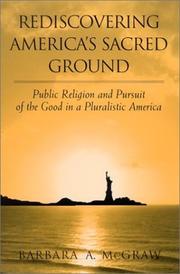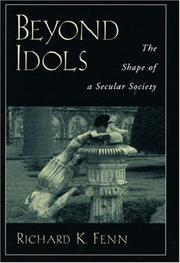| Listing 1 - 10 of 83 | << page >> |
Sort by
|
Book
ISBN: 3631316127 Year: 1998 Publisher: Frankfurt am Main Lang
Abstract | Keywords | Export | Availability | Bookmark
 Loading...
Loading...Choose an application
- Reference Manager
- EndNote
- RefWorks (Direct export to RefWorks)
Book
ISBN: 0268007578 Year: 1986 Publisher: Notre Dame University of Notre Dame press
Abstract | Keywords | Export | Availability | Bookmark
 Loading...
Loading...Choose an application
- Reference Manager
- EndNote
- RefWorks (Direct export to RefWorks)
Book
ISBN: 9004719059 9789004719057 Year: 2025 Publisher: Leiden: Brill,
Abstract | Keywords | Export | Availability | Bookmark
 Loading...
Loading...Choose an application
- Reference Manager
- EndNote
- RefWorks (Direct export to RefWorks)
Most great religious traditions are global in scope, but they are often used to promote nationalist and isolationist ideas. Why do politicians in Poland and Lithuania stress the strong bond between the Catholic Church and the national identities? And how are ethno-religious conflicts expressed in Norway? In this book, you will find new data and new insights, providing explanations for these and other questions. Fascinating case studies from Europe and China are the basis for analyses on how global interconnectedness sparks both unity and conflict within religious spheres, demonstrating the interplay of local and global influences as well as the dynamics of glocalization.
Globalization --- Globalization --- Civil religion

ISBN: 0791486958 1417506857 9781417506859 0791457060 9780791457061 0791457052 9780791457054 9780791486955 Year: 2003 Publisher: Albany State University of New York Press
Abstract | Keywords | Export | Availability | Bookmark
 Loading...
Loading...Choose an application
- Reference Manager
- EndNote
- RefWorks (Direct export to RefWorks)
Returning to the ideas of John Locke and the Founders themselves, Barbara A. McGraw examines the debate about the role of religion in American public life and unravels the confounded rhetoric on all sides. She reveals that no group has been standing on proper ground and that all sides have misused terminology (religion/secular), dichotomies (public/private), and concepts (separation of church and state) in ways that have little relevance to the original intentions of the Founders. She rediscovers a theology underlying the founding documents of the nation that is neither anyone's particular religion nor one requiring religion. Instead, it justifies freedom of conscience for all and provides a two-tiered public forum—a civic public forum and a conscientious public forum—for the debate itself and the actions that debate inspires. America's Sacred Ground—this theology and its public forum—determines the meaning of freedom and the ways in which Americans can pursue "the good": good government, good communities, good families, good relations between individuals, and good individuals from a plurality of perspectives. By exploring our past, McGraw answers the critical question, Who are we as a people and what do we stand for?
Civil religion --- United States --- Religion.
Book
ISBN: 9788815090058 8815090053 Year: 2002 Publisher: Bologna: Il Mulino,
Abstract | Keywords | Export | Availability | Bookmark
 Loading...
Loading...Choose an application
- Reference Manager
- EndNote
- RefWorks (Direct export to RefWorks)
Christianity --- Civil religion --- Secularization (Theology)
Book
ISBN: 1625641923 9781625641922 Year: 2013 Publisher: Eugene: Wipf & Stock,
Abstract | Keywords | Export | Availability | Bookmark
 Loading...
Loading...Choose an application
- Reference Manager
- EndNote
- RefWorks (Direct export to RefWorks)
Religion --- Civil religion --- United States

ISBN: 0195143698 Year: 2001 Publisher: New York (N.Y.): Oxford university press
Abstract | Keywords | Export | Availability | Bookmark
 Loading...
Loading...Choose an application
- Reference Manager
- EndNote
- RefWorks (Direct export to RefWorks)
Book
ISBN: 0231550391 Year: 2020 Publisher: New York, NY : Columbia University Press,
Abstract | Keywords | Export | Availability | Bookmark
 Loading...
Loading...Choose an application
- Reference Manager
- EndNote
- RefWorks (Direct export to RefWorks)
China’s constitution explicitly refers to its sovereign domain as “sacred territory.” Why does an avowedly secular state make such a claim, and what does this suggest about the relations between religion and the nation-state? Focusing primarily on China, Stating the Sacred offers a novel approach to nation-state formation, arguing that its most critical element is how the state sacralizes the nation.Michael J. Walsh explores the religious and political dimensions of Chinese state ideology, making the case that the sacred is a constitutive part of modern China. He examines the structural connection among texts (constitutions, legal codes, national histories), ostensibly universal and normative categories (race, religion, citizenship, freedom, human rights), and territoriality (the integrity of sovereignty and control over resources and people), showing how they are bound together by the sacred. Considering a variety of what he refers to as theopolitical techniques, Walsh argues that nation-states undertake sacralization in order to legitimate the violence of establishing and expanding their sovereignty. Ultimately, territorialization is a form of sacralization, and the foundational role of the sacred makes all nation-states religious states. Stating the Sacred offers new ways of understanding China’s approach to legality, control of the populace, religious freedom, human rights, and the structuring of international relations, and it raises existential questions about the fundamental nature of the nation-state.
Book
ISBN: 9780739166642 Year: 2012 Publisher: Lanham Lexington books
Abstract | Keywords | Export | Availability | Bookmark
 Loading...
Loading...Choose an application
- Reference Manager
- EndNote
- RefWorks (Direct export to RefWorks)
Book
ISBN: 3402137348 Year: 2021 Publisher: Münster, Germany : Aschendorff Verlag GmbH & Co. KG,
Abstract | Keywords | Export | Availability | Bookmark
 Loading...
Loading...Choose an application
- Reference Manager
- EndNote
- RefWorks (Direct export to RefWorks)
| Listing 1 - 10 of 83 | << page >> |
Sort by
|

 Search
Search Feedback
Feedback About UniCat
About UniCat  Help
Help News
News